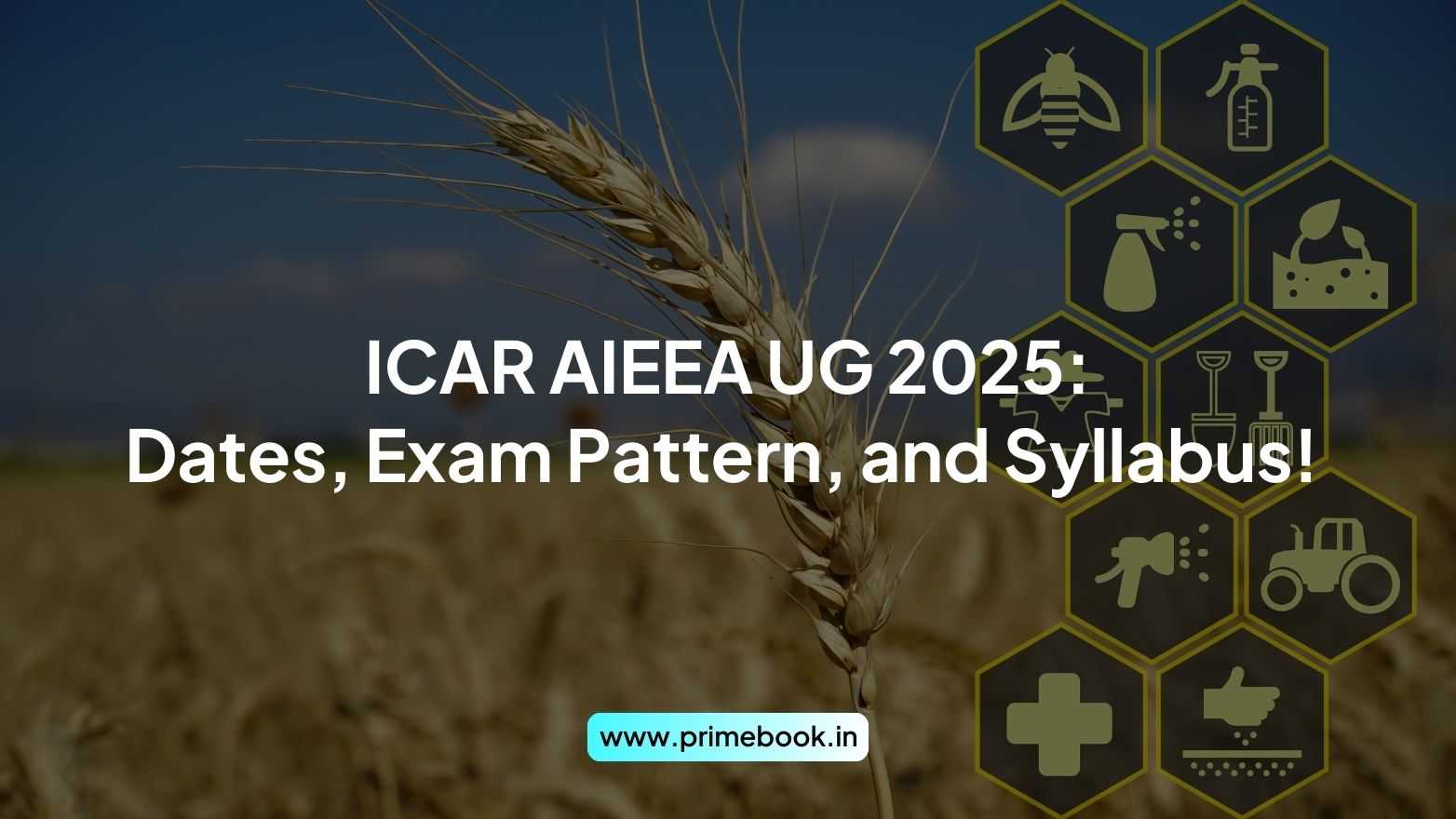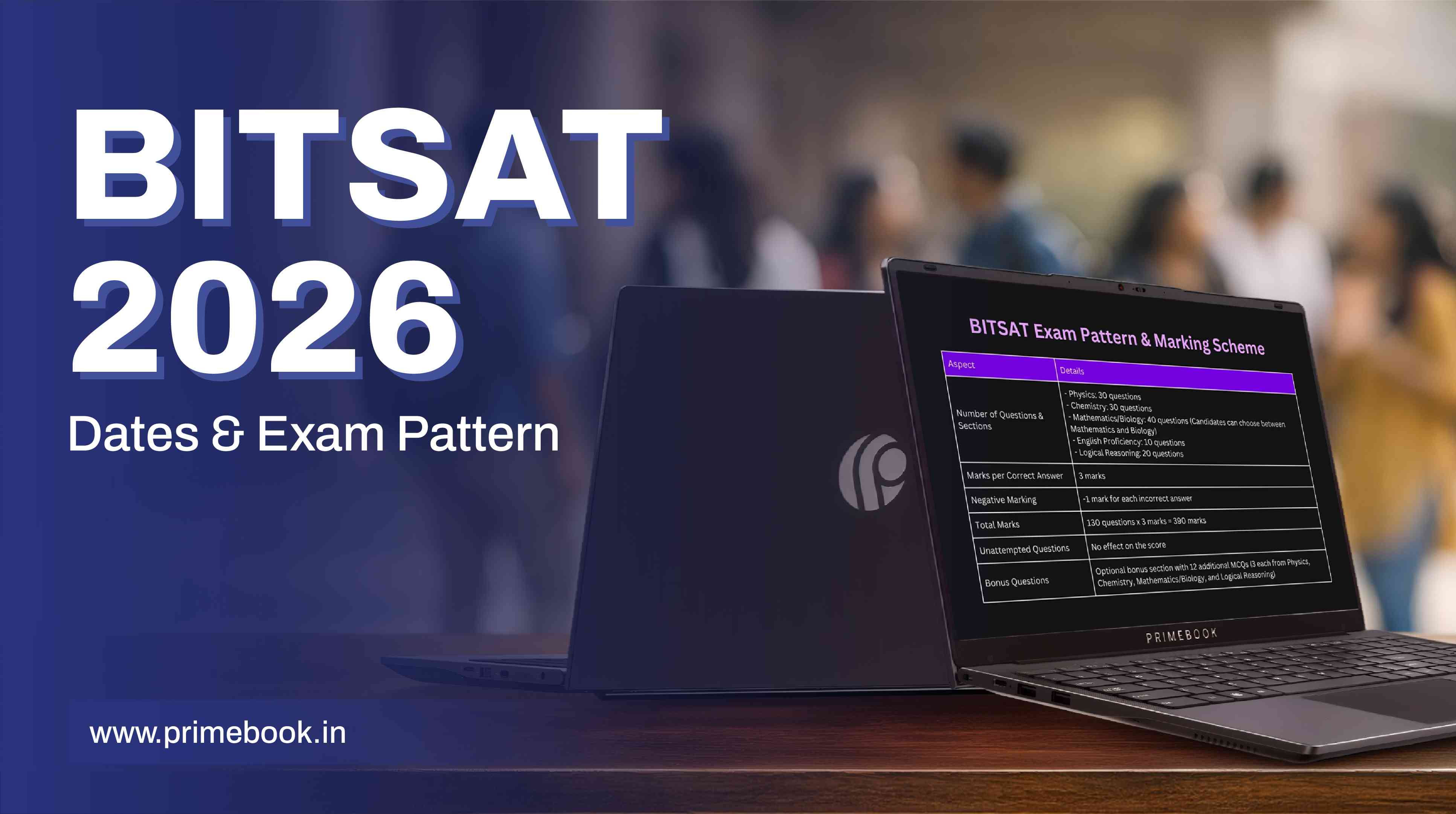Blogs / Student's Corner / ICAR AIEEA UG 2025: Dates, Exam Pattern, and Syllabus!
Blogs / Student's Corner / ICAR AIEEA UG 2025: Dates, Exam Pattern, and Syllabus!

Primebook Team
23 May 2025

ICAR AIEEA UG 2025: Dates, Exam Pattern, and Syllabus!
Planning to pursue an undergraduate degree in agriculture or allied sciences? Well, the ICAR AIEEA UG 2025, conducted via CUET-UG, will be your entry point to top agricultural universities in India. With the application process closed, it’s important to move beyond the basics and start preparing with a clear understanding of how the exam works. Knowing the paper structure, subject combinations, and syllabus topics can help you make every study hour count. So, in this blog, we will walk you through all the crucial details of ICAR AIEEA UG 2025. Read on to understand the exam and prepare with confidence and focus.
About ICAR AIEEA UG
The All India Entrance Examination for Admission - Undergraduate, or ICAR AIEEA UG, is a national-level entrance exam held for admission to undergraduate degree programs in agriculture and allied sciences across India. Since 2023, the ICAR AIEEA UG has been integrated with the Common University Entrance Test (CUET-UG). The exam, therefore, is conducted by the National Testing Agency (NTA) on behalf of the Indian Council of Agricultural Research (ICAR).
Through this exam, you can apply for ICAR-recognised UG programs such as B.Sc. (Hons) Agriculture, Horticulture, Forestry, Community Science, Sericulture, Food Nutrition and Dietetics, and more. Admission is granted based on your CUET-UG scores, followed by a centralised online counselling process conducted by ICAR.
ICAR AIEEA UG 2025 Important Dates
From application corrections to result declaration, each step in the ICAR AIEEA UG 2025 process is time-bound. Here’s a complete timeline of important dates to help you stay organised and avoid missing any key updates.
|
Event |
Date |
|
Notification Release |
March 1, 2025 |
|
Application Window |
March 1 – March 24, 2025 |
|
Correction Window |
March 26 – March 28, 2025 |
|
Exam City Slip Release |
May 7, 2025 |
|
Admit Card Release |
May 13 onwards (in phases) |
|
CUET-UG Exam Dates |
May 13 to June 3, 2025 |
|
Provisional Answer Key |
4th week of June 2025 (tentative) |
|
Final Answer Key |
Late June 2025 (tentative) |
|
Result Declaration |
July 2025 |
|
ICAR Counselling Begins |
July 2025 |
Note: These dates are based on official announcements. For live updates, check CUET and ICAR’s official websites.
ICAR AIEEA UG 2025 Exam Pattern
Exam pattern is the foundation of any entrance preparation, and understanding it thoroughly can give you a clear strategic edge. This is because it doesn’t just tell you what to expect on exam day, but also helps shape how you study, what you prioritise, and how you pace yourself across sections. So, here’s how the ICAR AIEEA UG 2025 exam is structured through CUET-UG.
|
Particulars |
Details |
|
ICAR AIEEA UG 2025 Exam Mode |
Computer-Based Test (CBT) at designated centers |
|
ICAR AIEEA UG 2025 Exam Medium |
English and 12 regional languages in India |
|
ICAR AIEEA UG 2025 Exam Frequency |
Once a year |
|
ICAR AIEEA UG 2025 Exam Duration |
3 hours 15 minutes (for most subject combinations) |
|
ICAR AIEEA UG 2025 Question Types |
Multiple Choice Questions (MCQs) |
|
ICAR AIEEA UG 2025 Total Sections |
Up to 4 (Language, 2 Domain Subjects, and General Test) |
|
ICAR AIEEA UG 2025 Total Marks |
300 (for most subject combinations) |
|
ICAR AIEEA UG 2025 Marking Scheme |
+5 for correct, -1 for incorrect |
ICAR-Approved Subject Combinations
While CUET-UG allows a wide range of subject combinations, only a few subsets of these are accepted by ICAR for undergraduate agriculture and allied programs. They are as follows.
-
Physics + Chemistry + Biology (PCB)
-
Physics + Chemistry + Mathematics (PCM)
-
Agriculture + Biology + Chemistry
-
Agriculture + Physics + Chemistry
*Disclaimer: Selecting the wrong combination in your CUET form can make you ineligible during ICAR counselling.
ICAR AIEEA UG 2025 Syllabus
The syllabus for ICAR AIEEA UG 2025 is based on the NCERT Class 12 curriculum for the chosen subjects. Here’s a breakdown of the syllabus for each of the sections.
Syllabus for The Language Paper (Compulsory)
You must choose one language (usually English or Hindi, unless specified otherwise by the university). The syllabus includes:
-
Reading Comprehension (Factual, Narrative, and Literary Passages)
-
Vocabulary (Synonyms, Antonyms, Word Meanings)
-
Grammar Usage (Tenses, Sentence Correction, Error Spotting)
-
Verbal Ability and Sentence Rearrangement
Syllabus for The Two Domain Subjects (Selective)
Following the specific subject combinations approved by ICAR, here’s the syllabus for each.
Physics Syllabus
-
Physical World and Measurement
-
Kinematics
-
Laws of Motion
-
Work, Energy, and Power
-
System of Particles and Rotational Motion
-
Gravitation
-
Properties of Bulk Matter
-
Thermodynamics
-
Behavior of Perfect Gas and Kinetic Theory
-
Oscillations and Waves
-
Electrostatics
-
Current Electricity
-
Magnetic Effects of Current and Magnetism
-
Electromagnetic Induction and Alternating Currents
-
Electromagnetic Waves
-
Optics
-
Dual Nature of Matter and Radiation
-
Atoms and Nuclei
-
Electronic Devices
-
Communication Systems
Chemistry Syllabus
-
Some Basic Concepts of Chemistry
-
Structure of an Atom
-
Classification of Elements and Periodicity in Properties
-
Chemical Bonding and Molecular Structure
-
States of Matter: Gases and Liquids
-
Thermodynamics
-
Equilibrium
-
Redox Reactions
-
Hydrogen
-
The s-Block Element
-
Some p-Block Elements
-
Organic Chemistry – Basic Principles and Techniques
-
Hydrocarbons
-
Environmental Chemistry
-
Solid State
-
Solutions
-
Electrochemistry
-
Chemical Kinetics
-
Surface Chemistry
-
General Principles and Processes of Isolation of Elements
-
The p-Block Element
-
The d- and f-Block Elements
-
Coordination Compounds
-
Haloalkanes and Haloarenes
-
Alcohols, Phenols, and Ethers
-
Aldehydes, Ketones, and Carboxylic Acids
-
Organic Compounds Containing Nitrogen
-
Biomolecules
-
Polymers
-
Chemistry in Everyday Life
Biology Syllabus
-
Diversity of Living Organisms
-
Structural Organisation in Animals and Plants
-
Cell Structure and Function
-
Plant Physiology
-
Human Physiology
-
Reproduction
-
Genetics and Evolution
-
Biology and Human Welfare
-
Biotechnology and Its Applications
-
Ecology and Environment
Agriculture Syllabus
-
Agrometeorology
-
Genetics
-
Plant Breeding
-
Biochemistry
-
Microbiology
-
Livestock Production
-
Crop Production
-
Horticulture
Mathematics Syllabus
-
Relations and Functions
-
Inverse Trigonometric Functions
-
Matrices and Determinants
-
Continuity and Differentiability
-
Application of Derivatives
-
Integrals
-
Differential Equations
-
Vector Algebra
-
Three-Dimensional Geometry
-
Linear Programming
-
Probability
-
Mathematical Reasoning
Syllabus for The General Test Paper
The General Test section is optional and is only required for a few ICAR UG programs, depending on the university’s eligibility criteria. It is meant to assess general aptitude and awareness beyond subject knowledge. Here’s what it covers.
-
Quantitative Aptitude
-
Logical and Analytical Reasoning
-
General Awareness & Current Affairs
-
Numerical Ability & Basic Arithmetic
-
Reading Comprehension
To conclude, now that you have complete clarity on the exam structure and syllabus, your next step should be building a study plan that prioritizes consistency over volume. Stick to NCERT books, practice section-wise mock tests, and double-check that your subject choices match ICAR’s counselling requirements. There’s no shortcut here, but there’s also no uncertainty if you prepare with intent!
Also Read: Top Colleges in Hyderabad for B.Sc. Agriculture


 Related Blog
Related Blog









